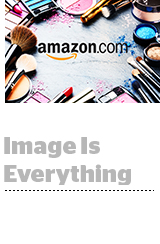 Here’s today’s AdExchanger.com news round-up… Want it by email? Sign up here.
Here’s today’s AdExchanger.com news round-up… Want it by email? Sign up here.
The Makeup Breakup
Amazon is the largest online cosmetics seller, but many top brands see the platform – “a scroll of endless products on white background” – as incompatible with luxury appeal, reports Bloomberg BusinessWeek. The EU’s top court ruled last month that luxury goods manufacturers could restrict products from Amazon for that reason. But Amazon is “uniquely positioned” for success in cosmetics, according to a company statement. If manufacturers boycott, Amazon doesn’t lose and the luxe brands that do sell on Amazon (like Revlon) win. There’s also a swarm of “young independent labels,” ecommerce-native makeup companies built off the back of Facebook, Instagram and Amazon, nibbling away at the bottom of the market like pretty piranhas. More.
Secret Chatter
Snapchat is struggling to sync engineering, sales and content due to the company’s culture of secrecy, even among internal groups, according to a report by the Daily Beast. One whole floor of Snapchat’s New York City office is entirely off-limits, and “workers are left to speculate what goes on there.” But it’s hard to blame Snapchat for keeping a tight lid. The once-coolest kid on the block is forced to use insiders to beta test new products as it contends with Facebook copycat versions of seemingly everything the company develops. And there might be something else Snapchat wants to keep secret: Daily active user metrics obtained by the Daily Beast for new products Snapchat is counting on for growth, like Snap Maps, Discover and Geofilters, are stagnant. More.
Automated Guaranteed 2.0
The IAB updated its spec for automated guaranteed. The new tech standard, OpenDirect 2.0, allows buyers and publishers to negotiate prices and adds support for digital out-of-home. The standard also brings automated guaranteed and private marketplaces together, with the aim of improving access to deals where inventory and pricing are guaranteed and the campaigns run like direct deals in the ad server. Check out the blog post. “We expect that new OpenDirect 2.0 functions – deal discovery, negotiation support and publisher aggregation – will compel companies to adopt and implement OpenDirect,” Dennis Buchheim, GM of the IAB Tech Lab, tells AdExchanger.
Unpoppable
Mobile pop-up ads and redirects still plague mobile browsers, particularly for top-tier publishers. Ad exchanges “still rely on generating ‘blacklists’ of malicious sites, and it’s difficult to keep up with the rapid transformations attackers use to stay ahead,” writes Wired. Buyers on these exchanges are “not well-vetted enough and are given too much leeway with regards to JavaScript code execution,” says Will Strafach, an iOS security researcher and president of Sudo Security Group. “I think the conversation has to change,” according to Fog Creek software CEO Anil Dash. “This is an attack on publishers, being enabled by their ad dollars.” More.
But Wait, There’s More!
This post was syndicated from Ad Exchanger.

More Stories
Tinder Takes on the Skeptics, Claiming Dating App Fatigue Is ‘Overstated’
Here Are the Ads That Made Creatives Jealous in 2024
By the Book: How ‘The Fugitive’ Director and an Investigative Journalist Collaborated on 2024’s Timeliest Thriller